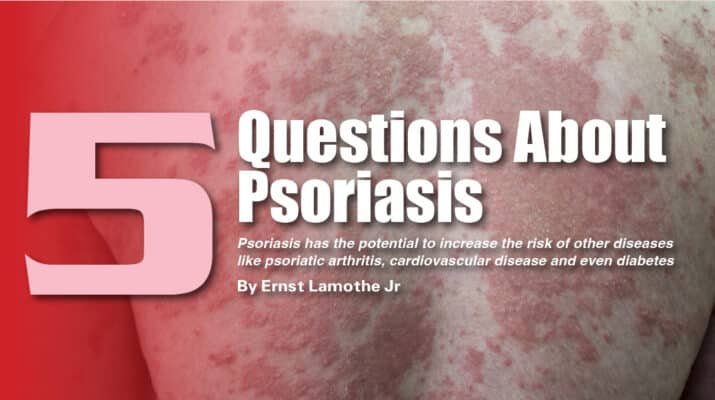Psoriasis has the potential to increase the risk of other diseases like psoriatic arthritis, cardiovascular disease and even diabetes
By Ernst Lamothe Jr

In a world where appearances often dictate perceptions, psoriasis remains a misunderstood ailment that affects millions.
This chronic autoimmune condition not only manifests through visible skin lesions but also carries profound emotional and physical challenges, prompting a deeper conversation about awareness, support and the need for compassionate understanding.
“Psoriasis is not just a skin condition. It’s linked to systemic inflammation and can increase the risk of other diseases like psoriatic arthritis, cardiovascular disease and diabetes,” said dermatologist Ibrahim Tangoren, board-certified in dermatology and pediatric dermatology in Syracuse. “Psoriasis is a chronic autoimmune skin disorder that accelerates the growth cycle of skin cells, leading to thick, scaly and often itchy or painful patches. These patches most commonly appear on the elbows, knees, scalp and lower back but can occur anywhere on the body.”
Tangoren, who owns and operates I. A. Tangoren M.D. Dermatology & Dermatologic Surgery in Syracuse, answers five questions about psoriasis.
1. What causes and aggravates psoriasis?
A: Several factors can aggravate psoriasis, including stress, skin injuries such as cuts, scrapes, sunburn, infections, changes in weather and certain medications. Psoriasis can be hereditary in nature but can also develop spontaneously. The exact cause is unknown, but psoriasis results from an overactive immune system that mistakenly attacks healthy skin cells. There are many key factors including genetics, immune system dysfunction such as T-cells triggering excessive skin cell production or environmental triggers like infections, stress, injury to the skin. Scientists have identified over 80 genetic markers linked to psoriasis.
In addition, medications that have been associated with psoriasis include beta-blockers including atenolol, metoprolol and propranolol, amoxicillin, lithium, antimalarials, terbinafine, calcium channel blockers, captopril, glyburide, granulocyte colony-stimulating factor and interferons.
2. Why should people care about this ailment?
A: Psoriasis can significantly impact quality of life, leading to physical discomfort, emotional distress and social challenges. It can also be associated with other health issues, such as psoriatic arthritis, cardiovascular disease and diabetes.
This is a condition that affects more than 125 million and has been linked to serious conditions, including higher risk of heart disease, metabolic syndrome and depression. Visible plaques can lead to social anxiety and discrimination. It’s important to understand this ailment because there are common triggers with stress causing major flare ups.
3. What are the types of psoriasis?
A: Psoriasis varies which makes diagnosis interesting. Some patients live with plaque psoriasis, which is the most common form, characterized by raised, red patches covered with silvery scales. Guttate psoriasis appears as small, drop-shaped lesions, often triggered by infections.
Inverse psoriasis occurs in body folds, like armpits and groin, presenting as red, shiny lesions.
You have people who experience patches with silvery scales, small drop-like spots, white pus-filled blisters, widespread redness, crumbling nails or psoriasis that causes joint pain, stiffness and swelling.
4. How is it medically handled and what are the best treatments?
A: Topical treatments involving corticosteroids, vitamin D analogs and topical retinoids remain the standard of care. In addition, phototherapy: UV light exposure has been known to reduce symptoms.
Treatment depends on severity, specifically how much of the skin or body part is affected on the patient and cost. There are topical treatments for mild causes using corticosteroids and vitamin D. There are also biological drugs that suppress immune response. Scientists are exploring personalized medicine and gene therapy to correct immune dysfunction. The goal is to find a curative therapy with minimal to no side effects.
5. Who tends to get psoriasis and why?
A: Psoriasis can affect anyone. But it often starts in early adulthood. It tends to be more common in individuals with a family history of the condition, as genetics play a significant role. Other factors include obesity, smoking, and having certain infections or health conditions.
We also need to dispel some myths. People think psoriasis is contagious when it is an autoimmune disease and you can’t catch it. The condition is also more than only skin deep. It’s linked to arthritis, heart disease and depression.

